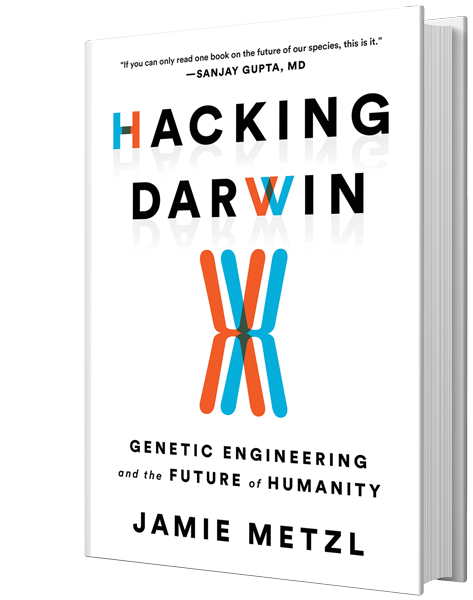Book clubs around the world are having incredible conversations based around the issues raised in Hacking Darwin. The paperback edition contains a Reading Group Guide raising the following questions:
- Hacking Darwin describes a future that is both exhilarating and frightening. What parts of the book made you feel excited about the potential of genetic technologies to help people and make our world a better place? What parts of the book frightened you, and why?
- The book outlines how aggressively humans have remade the world around us through hunting, agriculture, medicine, and urbanization. Much of what we call “nature,” including most of the foods we eat and the forests we hike in, has been significantly remade by our ancestors. What does it mean for something to be natural? How does the application of human ingenuity to the world around us make something unnatural? Should the fact that human genetic engineering often feels unnatural be a reason for not doing it?
- Would you support the application of gene therapy in your child to alter the expression of a single genetic mutation threatening his or her life? If not, why not? If so, would you also support gene editing the pre-implanted embryo of your potential future child to prevent the deadly mutation from taking hold in the first place? What are the essential differences between these two interventions?
- Sexual reproduction has existed for about 1.2 billion years and been a key driver of diversity and resilience in the animal world. However, Jamie Metzl argues that while humans will remain a sexually reproducing species we’ll less and less conceive our children through sex. What are your feelings on making a baby through IVF and embryo selection if doing so could significantly reduce the chances your future child might be born with a harmful genetic abnormality?
- If you were already using advanced reproductive technologies in the baby-making process to prevent disease, would you want information about other potential genetic diseases, disorders, and traits? What type of genetic information would you want to have? Is there any information you would not want to have?
- If you decide to genetically engineer your future children though advanced embryo selection and limited gene editing, what traits would you prioritize? What would be the limits of this intervention?
- Determining how to use genetic engineering in ways that optimize benefits and minimize harm will be among the greatest ethical challenges of our generation. How can we best ensure that the application of these technologies will not undermine our essential equity and diversity? What restrictions should be established and on what basis?
- Imagine your descendants two hundred years from now. How might they be genetically different from humans today? How do you feel about that?
Join the Conversation
After your conversation, please feel free to submit your thoughts or questions to the Hacking Darwin forum, “Join the Global Conversation.”
